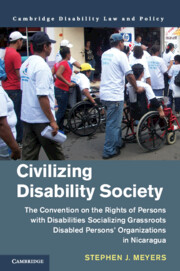 Civilizing Disability Society
Civilizing Disability Society Published online by Cambridge University Press: 27 September 2019
Los Pipitos, also known as the Association of Parents of Children with Disabilities, is one of Nicaragua’s most celebrated solidaridad organizations. In Segovia, the local Los Pipitos has become a symbol of what local civil society can do. The local chapter, which started out as a volunteer-run pre-school, now operates a large complex of services with a Youth Center for adolescents and youth with developmental disabilities as its centerpiece. This local civil-society initiative, however, is now out of step with international norms for promoting disability rights rather than providing rehabilitation and social support. Thus, the local chapter begins to face increasing pressure from the outside to close down the center and instead organize the youth and their parents in a campaign for disability rights. Eventually, the Youth Center is shut down by the national office and a new executive director is installed. But, after the new director fails to engender a rights-advocacy program, local parents organize against her and take the organization back. This results in a “back to basics” campaign where local parents decide to rededicate themselves to the values of solidaridad and leave disability rights advocacy behind.
To save this book to your Kindle, first ensure [email protected] is added to your Approved Personal Document E-mail List under your Personal Document Settings on the Manage Your Content and Devices page of your Amazon account. Then enter the ‘name’ part of your Kindle email address below. Find out more about saving to your Kindle.
Note you can select to save to either the @free.kindle.com or @kindle.com variations. ‘@free.kindle.com’ emails are free but can only be saved to your device when it is connected to wi-fi. ‘@kindle.com’ emails can be delivered even when you are not connected to wi-fi, but note that service fees apply.
Find out more about the Kindle Personal Document Service.
To save content items to your account, please confirm that you agree to abide by our usage policies. If this is the first time you use this feature, you will be asked to authorise Cambridge Core to connect with your account. Find out more about saving content to Dropbox.
To save content items to your account, please confirm that you agree to abide by our usage policies. If this is the first time you use this feature, you will be asked to authorise Cambridge Core to connect with your account. Find out more about saving content to Google Drive.